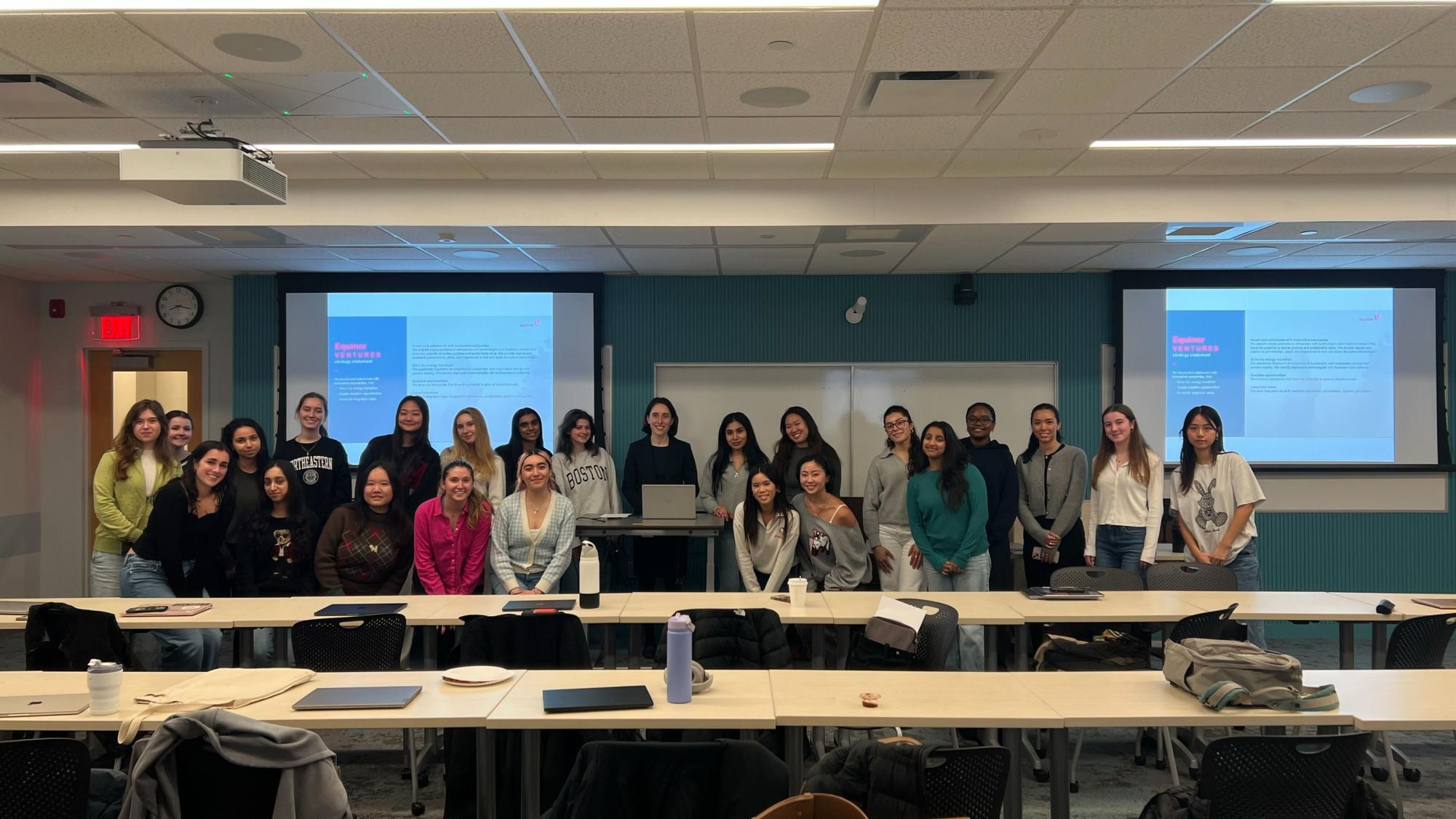Tejaswini Kambaiahgari, a Northeastern student startup founder, has years of experience in the world of venture capital. That time drew back the curtain on the lucrative industry, she said, exposing the deep gender divide that exists within.
“Female ventures get grilled on risks, while the male founders get asked about potential,” she said.
Kambaiahgari, a second-year product development graduate student, said such insights laid the foundation for her to join Girls Into VC @ Northeastern, which has transformed her perspective, knowledge and confidence in the VC space.
Launched at Harvard University in 2022 and modeled after Girls Who Invest, Girls Into VC is a women-led mentorship program with a uniting goal: “empowering young [college] women to break into venture capital.” With chapters in universities across the U.S., including one launched at Northeastern in the Fall 2024 semester, the organization has mentored thousands of young women into their early venture capital careers.
Vedanshi Seth, a Spring 2025 fellow of the club and rising fourth-year economics and psychology combined major, emphasized how effective the Girls Into VC curriculum was in transforming her understanding of the venture capital industry.
“When I just started the cohort, I was obsessed with Shark Tank, and I thought pitches do work, like how you see it in Shark Tank,” she said. “I’m much more confident in this space and feel more knowledgeable after the cohort has ended.”
Girls Into VC members are mentored through 10-week fellowships during the fall and spring semesters, and those with little or no prior venture capital experience are trained through educational programs and independent projects. Classes, homework and weekly meetings teach fellows about the intricacies of venture capital funding stages, evaluating a pitch deck and more. More advanced topics, such as what firms look for in candidates and how to be a standout applicant, are then introduced in later stages of the fellowship.
“I got to learn a lot about cap tables, [Annual Recurring Revenue] modeling, how to do deal sourcing and investment simulations,” Kambaiahgari said. “During our class sections, we take different examples and different startups and look at it from the VC’s lens and evaluate them.”
Kambaiahgari has pitched her startup, BaselineTech, which aims to make snowboarding more accessible through simulators, to venture capitalists numerous times. But has often struggled to even get an initial meeting, prolonging her fundraising journey. Through these experiences, she has gained hard-earned insights into the challenges of the industry, helping her develop a vision for how it could better embrace female founders.
“I often feel like people don’t take me seriously just because of my gender,” Kambaiahgari said. “I think that would change by having more female investors and VCs.”
Venture capitalists invest capital received from wealthy endowments and family offices in promising startup companies in exchange for equity stakes. A lucrative and competitive industry that attracts many students at Northeastern and elsewhere, venture capital has enabled the rise of high-profile companies like YouTube, Apple and DoorDash, and is responsible for a large part of the innovation and economic growth enjoyed by the United States and the rest of the world over the past few decades.
While venture capitalists aim to fund startups at the forefront of innovation, members of Girls Into VC feel gender disparities suppress innovation. Just 11% of venture capitalist partners are female, and in 2022, only 2% of venture capital investments were allocated to all-female founder teams, according to PitchBook. A 2013 study by Harvard Business School found that when presented with identical pitches by male and female voices, 68% of investors chose to fund male entrepreneurs, while only 31% funded their female counterparts.
“That’s one of the main reasons why I joined Girls Into VC, to be in a network or group that wants to amplify women-led innovation and build a more equitable funding ecosystem for females out there,” Seth said.

Seth believes that the training she received during the Girls Into VC fellowship has given her the confidence to take on the startup journey, just like Kambaiahgari.
After the fellowship ends, members have the opportunity to run for a position on the club’s executive board, or e-board. Members of the e-board take on roles like teaching educational material, managing applications, organizing guest speakers and managing the social media platforms, all working together to support the cohesive functioning of the club.
Beyond instilling members with foundational industry knowledge, Girls Into VC conditions members to think like a venture capitalist before they apply for an internship or externship.
“This is stressed a lot: Do the work without the job,” said Soledad Perez Leon, a rising third-year business administration and economics combined major and incoming president of Northeastern’s Girls Into VC chapter. “Think like a VC without having the position itself. That’s how you get the role.”
Female mentors and fellows are keenly aware of the impact gender has on their experiences and future careers in venture capital. Leon and Kambaiahgari see the challenges as both behavioral and systemic.
“Most VCs are going to invest their money in startups and companies that work in fields that they most understand, but also the people that look like them,” Leon said, who was a part of the Fall 2024 cohort.
As Girls Into VC has nurtured a successful community of more than 8,000 members worldwide, Northeastern’s Girls Into VC members say they’ll look to pass their knowledge on.
“Once you break in, I think it’s very important to return the favor, and if you, as a woman VC, can then mentor the next generation, [that will] have a trickle-down effect. I think that’s the best way to get the ball rolling and more women [in the industry],” Leon said.










